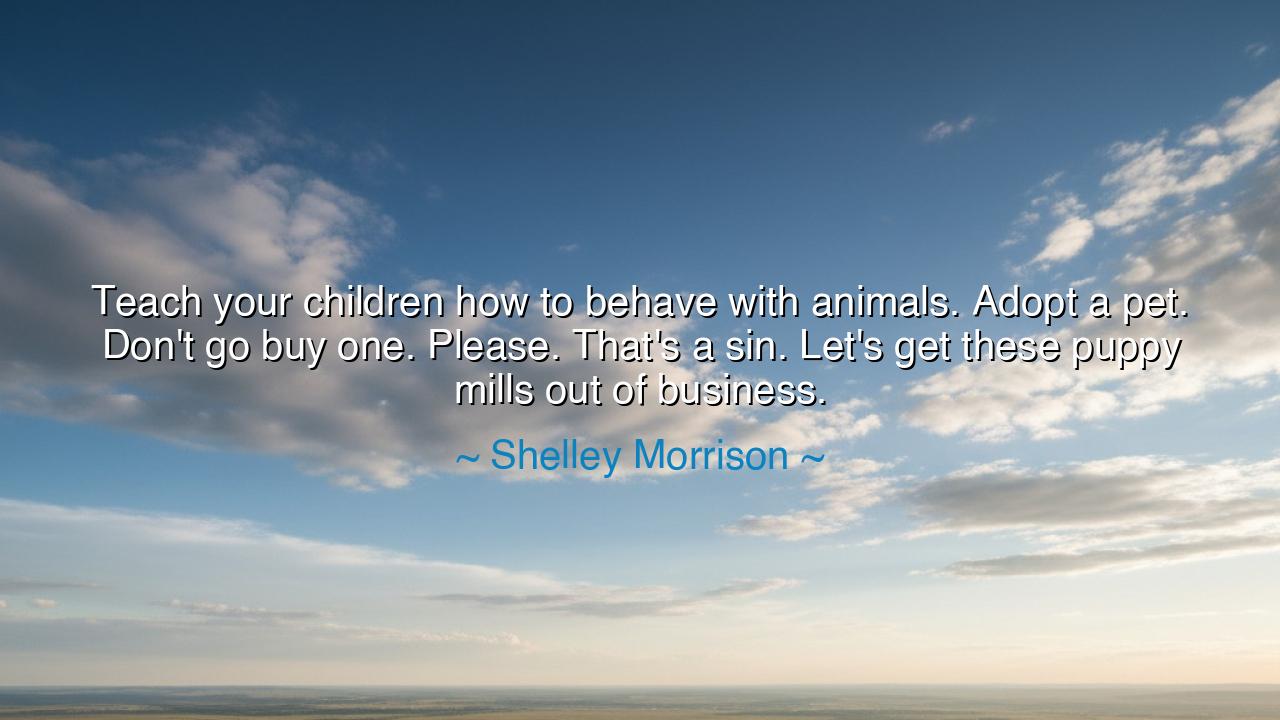
Teach your children how to behave with animals. Adopt a pet.
Teach your children how to behave with animals. Adopt a pet. Don't go buy one. Please. That's a sin. Let's get these puppy mills out of business.






Shelley Morrison, in her wisdom and compassion, once proclaimed: “Teach your children how to behave with animals. Adopt a pet. Don’t go buy one. Please. That’s a sin. Let’s get these puppy mills out of business.” These words, though spoken in the tongue of modern times, carry the weight of an ancient law: the law of mercy toward the innocent and the call to stewardship over creation. In them we hear both a command and a lament—a command to nurture kindness, and a lament for the cruelty of those who profit from suffering.
The first counsel is clear: “Teach your children how to behave with animals.” For the way a child treats the smallest creature reveals the shape of their heart. The ancients said, “He who is cruel to beasts will in time be cruel to men.” To raise a child in reverence for life is to sow the seeds of justice, empathy, and tenderness. The lamb, the bird, the dog, the cat—these are not mere companions, but teachers, entrusted to us by the same breath of life that gave us being. By guiding children to love, not harm, we forge generations whose strength will be balanced by compassion.
The second command strikes even deeper: “Adopt a pet. Don’t go buy one.” This is a rebuke to the marketplace that reduces living souls to commodities. The puppy mill, the breeding factory, is a modern cruelty, cloaked in the guise of commerce, yet founded on chains, cages, and endless suffering. To purchase from such places is to nourish the roots of exploitation; to adopt is to liberate, to rescue, to breathe hope into lives discarded by greed. Morrison names it rightly—a sin, for it is a violation not merely of law, but of the sacred bond between humanity and the creatures entrusted to us.
History offers its echoes. In the time of Saint Francis of Assisi, men lived harshly, and animals were often seen as tools or burdens. Yet Francis walked among them as brothers and sisters: he preached to birds, tamed the wolf of Gubbio, and called all creation his kin. His life stands as proof that reverence for animals is not weakness but holiness. Just as Francis’ voice called men of his time to mercy, so Morrison’s words call us now—to tear down the cages of puppy mills, to end the trade of suffering, and to honor the creatures who cannot speak for themselves.
The wisdom here is not for children alone, but for all who live. If we allow ourselves to treat animals as mere property, we slowly erode our own humanity. But if we choose adoption, if we choose to give a home to the abandoned, then we become healers in a world too often marred by cruelty. Every act of compassion toward a creature is a seed of justice planted in the soil of the earth. And when many such seeds are sown, the harvest is a more merciful world.
The lesson is thus: choose mercy over convenience, compassion over commerce. Teach the young to love all life. Open your homes to the abandoned, not the manufactured. Raise your voice against systems of cruelty. For every cage that is emptied through adoption is a blow against greed, and every child taught gentleness is a guardian raised for the future.
Therefore, O listeners, let Morrison’s plea become your vow. Refuse to feed the machinery of suffering. Embrace the path of adoption, the way of compassion. Honor the bond between mankind and creature, for in their eyes you will find loyalty unmeasured, in their presence, joy unspoken. And know this: the measure of a civilization is not in its monuments, nor in its wealth, but in how it treats the smallest and most vulnerable lives. By this measure, let us strive to be great.






AAdministratorAdministrator
Welcome, honored guests. Please leave a comment, we will respond soon